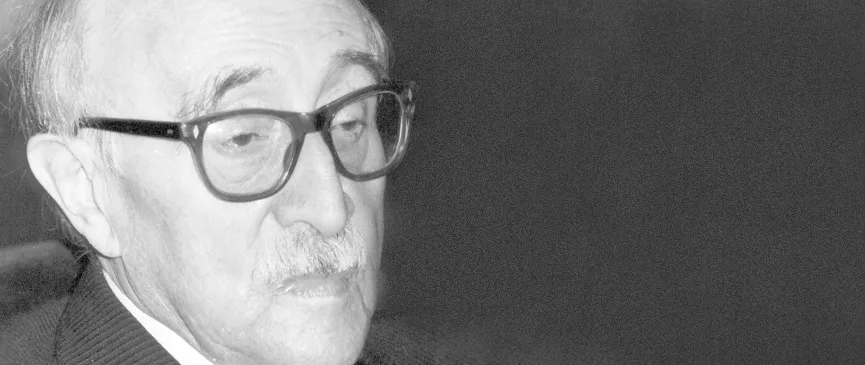Main content
Claudio Sánchez Albornoz Prince of Asturias Award for Communication and Humanities 1984

Claudio Sánchez Albornoz (Madrid, Spain, 1893 – Ávila, Spain, 1984), illustrious historian and republican politician, was born in Madrid on the 7th April 1893. He went to high school at the Escuelas Pías de San Fernando, acquiring the basis of a deep education in Latin, and once at university he dedicated himself completely to History.
Doctor in Philosophy and Arts of the University of Madrid, he passed the entrance examinations for the staff of Archives, Libraries and Museums, and at the age of twenty-eight he obtained, also by selection examination, the chair of Spanish History at the University of Barcelona, from where he would soon be transferred to Valladolid and later to Madrid. Before reaching the age of twenty he had already begun his first historical studies, centred upon the study of medieval institutions.
Appointed in 1932 as Rector of the Central University of Madrid, Sánchez de Albornoz, a person of firm democratic and liberal convictions, committed himself to the cause of the II Spanish Republic. A member of the Republican Action Party, he was elected as parliamentary deputy in the first parliament of the II Republic. He was to undertake great political activity during this phase, occupying, among others, the posts of Secretary for Public Instruction, Deputy-Chairman of Parliament and, in 1933, Minister for Foreign Affairs. In 1936 he was appointed ambassador in Lisbon, the city where he would stay until the autumn of that same year, when the Portuguese government broke off relations with that of Madrid.
After the civil war broke out, he went into exile in France. He took up residence in Bordeaux, in whose university he obtained a chair, and in 1940, faced with the occupation of France by the Germans, he decided to move to Argentina. Two years later he took over the running of the recently-established Institute of Spanish History in the Faculty of Philosophy and Arts at the University of Buenos Aires, where he dedicated himself to research and founded the journal Cuadernos de historia de España, at the same time beginning the training of a brilliant school of Hispanicists and medievalists. From 1959 to 1970 he occupied the presidency of the republican government in exile. In 1976, after living for almost forty years in America, he made a journey to Spain. During his stay he was received in a special audience by King Juan Carlos and gave various lectures and public statements loaded with emotion, nostalgia and memories. He was to return to Spain for good in July 1983, after recovering from a respiratory illness which had kept him in the Spanish Hospital of Buenos Aires for several months, and he settled in Ávila.
Of the enormous work which he carried out on the Spanish middle ages, the following works are worthy of special mention: Instituciones políticas y sociales del señorío de Asturias, León y Castilla durante los siglos VIII a XIII, Un feudo castellano en el siglo XIII, En torno a los orígenes del feudalismo, De Carlomagno a Roosevelt, España y el Islam, Otra vez Guadalete y Covadonga, Orígenes de Castilla: como nace un pueblo, Notas sobre libros leídos en el Reino de León hace mil años, La España musulmana, España, enigma histórico, Españoles ante la historia, Los reinos cristianos españoles hasta el descubrimiento de América, Orígenes del reino de Pamplona and La España cristiana de los siglos VIII al XI.
Honourary member of the Institute for Asturian Studies for his work as the foremost historian of the ancient Kingdom of Asturias, doctor honoris causa of the University of Oviedo and Adopted Son of Asturias, Sánchez Albornoz was a holder of the Gold Medals of Ávila and of the Complutense University, and of the Grand Crosses of Alfonso X the Wise, and of the order of Carlos III. He was also a member of the Academy of the Royal Academy of History.
End of main content
